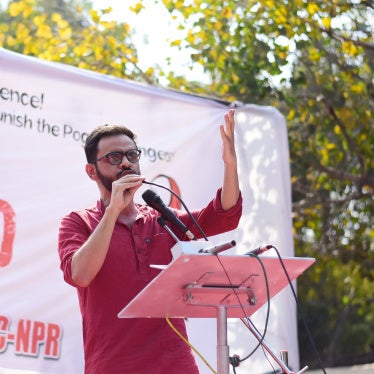(New York) Human Rights Watch today urged diplomats in Beijing to send observers to the trial next week of Chinese webmaster Huang Qi, calling it a significant test of the limits of free expression.
It called in particular on countries that have official "dialogues" on human rights with China to attend the trial in Chengdu, Sichuan scheduled to begin on Tuesday in the Chengdu Intermediate People's Court. The United Kingdom has a dialogue meeting set for February 12-14 in Beijing, and the European Union has a meeting with China in Stockholm scheduled for February 22.
"It's precisely when serious violations arise that the human rights dialogues with China should be put to the test," said Jan van der Made, a researcher for Human Rights Watch. "Are exchanges on human rights confined to polite rhetoric, or will China's dialogue partners take issue with the treatment of people like Huang Qi?"
Huang Qi, a computer engineer, was charged with the political crime of "instigation to subvert state power." In the indictment signed by Li Jian, chief of the Chengdu City Police on August 21, 2000, Huang Qi was accused of using his "Tianwang Missing Persons Web Site" to post material about various taboo topics, including the democracy movement, the Xinjiang independence movement, Falun Gong, and demands for the reversal of the official position on "June 4." Huang Qi was detained on June 3, 2000.
Van der Made said the Huang Qi case should be of concern not only to the diplomatic community but to international corporations operating websites in China or promoting sales of Internet equipment and software.
"This case is designed to send a warning to anyone who uses the Internet to transmit 'sensitive' material," said Van der Made. He noted that Article 19 of the International Covenant on Civil and Political Rights, a human rights treaty that China got great credit for signing in 1998 but has yet to ratify, guarantees the right of anyone to "seek, receive and impart information and ideas of all kinds, regardless of frontiers" through the media of his or her choice.
Expressions of concern by foreign companies could help send a strong message to Beijing that efforts to censor the Internet and otherwise restrict freedom of expression could have a deleterious impact on the investment climate.
"Huang Qi, an urban, educated, middle class computer user, is exactly the kind of person that Microsoft, Sun Microsystems, Motorola and others want to reach in China," Van der Made said. "They have good reason to come to his defense."
On September 25, Huang Qi was reportedly beaten in detention by three policemen after notes he had taken were confiscated. During the beating, he lost one tooth and got a scar on his forehead, according to a letter he gave to his lawyer in November.
On January 2, 2001, the Chengdu City Procuratorate accused Huang Qi of violating Articles 103 and 105 of the Criminal Law. The articles punish actions that involve "organizing national separatism, destroying national unity"; "organizing, plotting or carrying out activities aimed at subverting state political power"; and "overthrowing the socialist system." If convicted, he could receive up to ten years in prison.
Human Rights Watch has documented some twenty cases of people who have been detained for actions relating to the Internet. Since the Internet in China became commercial in 1995, Chinese lawmakers have issued more than sixty regulations in an attempt, largely unsuccessful, to bring the Internet under state control.








